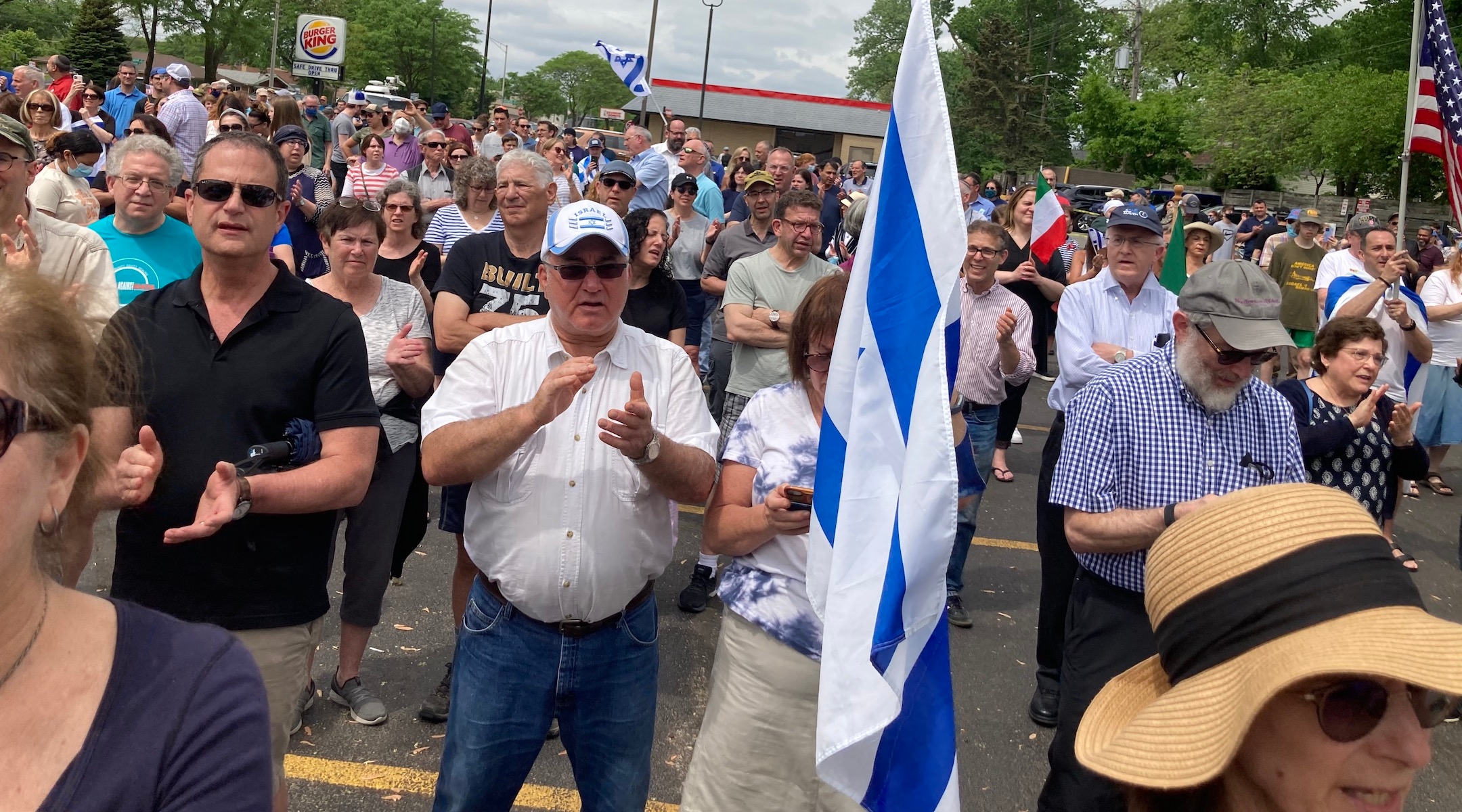In a heavily Jewish suburb of Chicago, a rally against antisemitism draws hundreds
Hundreds gather in Skokie, Ill., in a demonstration against antisemitism, May 23, 2021. (Yvette Alt Miller)
Published May 24, 2021
SKOKIE, Ill. (JTA) — After a synagogue in this Chicago suburb was vandalized on May 16 in what police are calling a hate crime, local rabbis could not dwell on the damage: They had to prepare for Shavuot, the two-day Jewish holiday that began that evening.
A week later, though, the rabbis were the engine behind a 500-person rally in this heavily Jewish town against antisemitism.
Skokie perhaps is best known as the place town where, in 1977, free-speech advocates fought for neo-Nazis to be able to march, only to have the eventual rally be outnumbered by local Jews and their allies.
This time, too, Chicago-area Jews were joined by allies from other communities on Sunday, one week after pro-Palestinian protesters vandalized Skokie’s Persian Hebrew Congregation and left area Jews rattled and fearful for their safety.
“This is not a protest,” Rabbi Zvi Engel of Congregation Or Torah told the crowd gathered next to his synagogue on one of the town’s main thoroughfares. “This is a cry of pain.”
The rally was a message that Chicago-area Jews will not accept recent anti-Jewish vitriol and the vandalism of a local synagogue in silence. It was one of several public gatherings held in recent days by Jewish communities and pro-Israel groups in many cities in response to sweeping pro-Palestinian rallies and incidents of antisemitism during the Israel-Gaza conflict.
Synagogues of all Jewish denominations in Skokie served as co-sponsors of the rally along with several other Jewish organizations, including the Simon Wiesenthal Center, a Los Angeles-based group that advocates against antisemitism.
Alison Pure-Slovin, director of the center’s Midwest region, said she had heard from an unusual number of non-Jews asking to be included in advocacy against antisemitism.
“People have been reaching out to me for the past few weeks saying what can we do to support the Jewish people?’” Pure-Slovin said, but adding that the number remained disappointingly small.
“We as Jews march against hate — why don’t others reach out to us?” she wondered.
Two non-Jewish organizations officially partnered with the rally: the Iraqi Christian Relief Council and the Joint Civic Committee of Italian Americans, whose members added Italian flags alongside the American and Israeli ones on display.
“We want to represent the Italian-American community,” Frank Di Paolo said. “We’ve also been discriminated against.”

Some brought Israeli flags to the rally, which was organized after a local synagogue was vandalized. (Yvette Alt Miller)
Others joined to demonstrate solidarity with the local Jewish community.
“It’s important to stand against hate and antisemitism,” said Josina Morita, commissioner of the Metropolitan Water Reclamation District of Greater Chicago and a Skokie resident who brought her 1-year-old daughter, Mei Mei, to the rally.
Others called attention to who was not there.
Patrick John, the first Black Christian president of the Decalogue Society of Lawyers, a Jewish legal society in Chicago, in a speech criticized the Black Lives Matter movement for taking up the cause of Palestinian rights uncritically. John lamented that there were not more African-Americans at the rally supporting their Jewish neighbors.
Chicago’s Jewish federation, the Jewish United Fund, was not among the rally organizers, leaving that work to local Jewish leaders. The federation had worked with local authorities to ensure that last week’s vandalism was treated as a hate crime, according to its president, Lonnie Nasatir.
“Right now we’re encouraged by different parts of the community,” Nasatir said.
The federation’s approach drew support from some of the rally participants
“I think the response [to antisemitism] should always be a grassroots response,” said Rabbi Leonard Matanky of Congregation KINS in Chicago, a rally sponsor.
The Skokie rally’s organizers hope that their grassroots activism can serve as a model for other communities at a time of fear and uncertainty.
“We’re stronger together,” said Rabbi Ari Hart of Skokie Valley Agudas Jacob, an Orthodox synagogue and another rally organizer.
Hart said the rally’s organizers — who ultimately included Reform, Conservative and Orthodox Jews — put aside any differences and came together to fight hate.
“Part of what ‘achdus’ means is you have to be flexible and inclusive,” Hart said, using the Hebrew word for Jewish unity.
Or Torah’s Rabbi Engel suggested that other communities organize across denominations.
“Those who wish us ill couldn’t care less what siddur [Jewish prayer book] you pray from,” he said. “They know we all have the same Torah, the same State of Israel, and that we are all from the same family.
“In times like these, we must stand together to give each other strength and to raise consciousness.”
The post In a heavily Jewish suburb of Chicago, a rally against antisemitism draws hundreds appeared first on Jewish Telegraphic Agency.
















